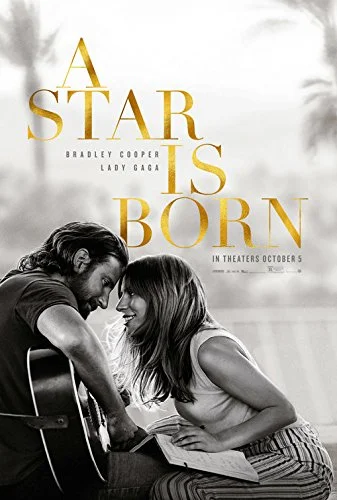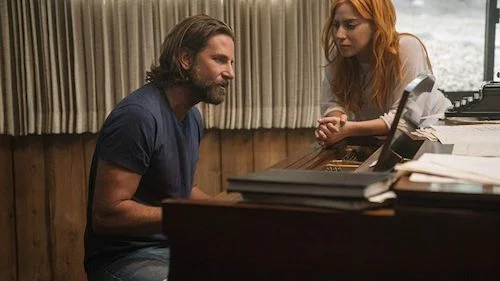A Star is Born
This should not have worked, and yet here we are. I’m not covering this film just because it’s been nominated for Best Picture. Many simply-decent films have been selected for that category, let’s be honest. No. It’s because A Star is Born version 5.0 is just a flat out terrific film. This is the fifth (count them! Five) iteration of the exact same story. There’s the 1937 one to start it all, starring Janet Gaynor. Next up was Judy Garland’s career comeback in 1954 (probably the best iteration, though none of them are particularly bad by any means). There was the rock version with Barbara Streisand in 1976, which probably was the start of the well feeling dry. Then there is Aashiqui 2, which is a Bollywood film I have to admit to not having seen (2013).
Why are we even discussing the actual fifth rendition of the same bloody story? Bradley Cooper had something to say in his directorial debut, and it was more than just a shred of admiration for some Hollywood flicks of yesteryear. A Star is Born has a great understanding of the current battles in contemporary music, mainly the shift between artistic integrity and success in the medium. It’s more than a jealousy thing here. It’s an actual admittance that popularity does not equate to substance when it comes to the current state of music. There’s an endless chase for capturing something real, and it gets threatened by a career that shoots past this mission.
Jackson Maine (Cooper) is a country rock legend that is suffering behind closed doors; the world only sees his brilliance until his major mea culpa in the film. He is hell bent addicted to substances (alcohol and painkillers), because he can not shake off his past. He is obsessed with finding the truth in his performances, and that includes clinging onto the memories that haunt him (even in the literal form of tinnitus, which Maine neglects and worsens). He finds truth in the form of Ally (Gaga), but he feels abandoned by this window of opportunity when she goes on to pursue the very dreams she once gave up on.
What makes all of this fascinating to witness is the film’s personal approach. This is a music based film, but it is absolutely not a musical. The filming (done by the wonderful Matthew Libatique) feels like a mixture of documentary and home recording footage. There is a slight graininess, and an over-saturation of colours and darkness. This is all space you are invading with your nosiness; the artists behind closed doors, so to speak. Not much of this feels glamorous, and any piece that does could have been captured by a mobile device or a PVR system. We get to experience Ally’s rise nonetheless, and these moments are sincere.
You have an acting staple in Cooper that sets the mood. His outbursts stain the scenery. His meltdowns pull the corners of the frame down with him. His joys are pure, and you can feel them as if they were yours. Then there is Lady Gaga, who has never been this reserved and natural in her professional career (she has seemed more theatrical in interviews, for crying out loud). She is much less visceral than Cooper, despite her many emotional scenes. Instead, she tries to internalize anguish, disappointment, or any other feelings of negativity. This is a kind person that is willing to work through difficulties, because things are finally starting to work for her (and she wants them to continue).
A Star is Born enjoys catapulting through events. You know Ally is frustrated by men, and you only get the tiniest glimpse of it at first. All you need to know is that there is clearly a history. Maine is an established musician. You don’t need more than the roaring crowd and excited passersby to know this. The slower moments are all shared by Maine and Ally, because these are the important capsules to retain during traumatic experiences. With one hell of a crushing ending, you know that this version of A Star is Born had to be told. It is through a fresh set of eyes, with a heavy emphasis on music in the 21st century, and it clearly knew how to add a candidness that was lacking in all of the previous iterations (which had more of a focus on the self perpetuated Hollywood-ness, which isn’t a bad thing by any means). Maybe the well wasn’t so dry after all (and neither were the eyes of many audience members).
Andreas Babiolakis has a Masters degree in Film and Photography Preservation and Collections management from Ryerson University, as well as a Bachelors degree in Cinema Studies from York University. His favourite times of year are the Criterion Collection flash sales and the annual Toronto International Film Festival.







